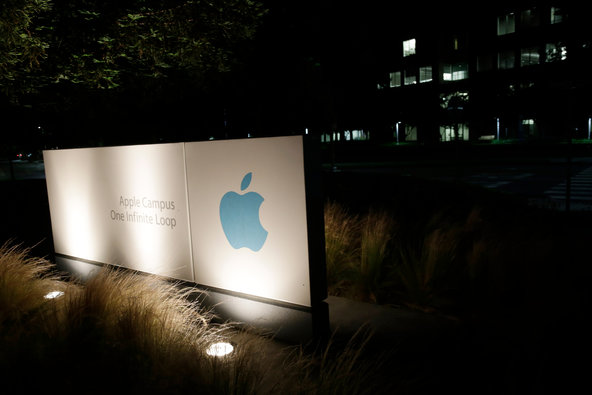 Marcio Jose Sanchez/Associated Press A sign outside of Apple’s headquarters in Cupertino, Calif. The company said Sunday that it does not store data related to customers’ location, map searches or search requests “in any identifiable form,” meaning it likely stores the data without linking it to a named individual.
Marcio Jose Sanchez/Associated Press A sign outside of Apple’s headquarters in Cupertino, Calif. The company said Sunday that it does not store data related to customers’ location, map searches or search requests “in any identifiable form,” meaning it likely stores the data without linking it to a named individual.
Amid reports that technology companies cooperated with the United States government’s surveillance efforts, Apple has maintained that it does not provide the government with unfettered access to its servers. On Monday, the company released some numbers and information about its online services to try to prove it.
In a statement on its Web site, Apple said that from December 2012 through May 2013, it received between 4,000 and 5,000 requests from American law enforcement agencies for customer data. Among those requests, government officials asked for information about roughly 10,000 accounts or devices, Apple said.
Apple said the requests came from federal, state and local authorities regarding both national security matters and criminal investigations. It said the most common types of request came from police investigations of robberies and other crimes, searches for missing children, attempts to prevent a suicide or searches for people with Alzheimer’s disease.
Apple also published details about its online communication services, iMessage and FaceTime. It said it chooses not to store the content of exchanges between customers on these services, and therefore it does not hand over this type of data to law enforcement agencies. Furthermore, it said, those conversations are encrypted, so nobody but the sender and the receiver can see them.
“Apple has always placed a priority on protecting our customers’ personal data, and we don’t collect or maintain a mountain of personal details about our customers in the first place,” the company said in the statement.
Apple said it also does not store data related to customers’ location, map searches or search requests “in any identifiable form,” meaning it likely stores the data without linking it to a named individual.
Article source: http://bits.blogs.nytimes.com/2013/06/17/apple-releases-some-data-on-government-requests/?partner=rss&emc=rss
